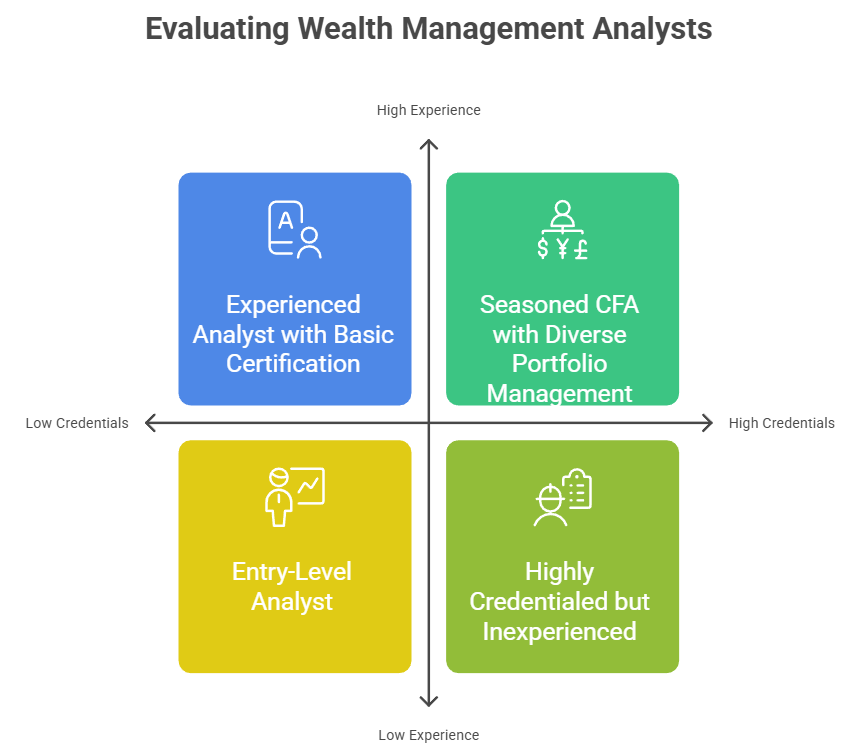
Why You Need a Wealth Management Analyst for Your Portfolio
Every high-net-worth individual, especially those juggling multiple assets or business interests, wants reassurance that their portfolio is both protected and primed for growth. That’s where a wealth management analyst comes into play. By blending financial know-how, technical skills, and an awareness of personal goals, this professional can help you make confident decisions that reflect your priorities. Below, you’ll see how having someone in this role can simplify your financial life, reduce stress, and open new doors for preserving and expanding your wealth.
Understand the Core Role

A wealth management analyst is like a strategic partner who helps ensure you’re prepared for life’s twists and turns. They look at everything from your current asset mix to your estate plans and tax strategies, then suggest ways to refine and optimize. According to the Bureau of Labor Statistics, management analysts (including those in wealth management) command a median wage of over $100,000 per year, reflecting the complexity and value of their expertise.
- They interpret market trends and identify opportunities that match your objectives.
- They factor in the psychology of financial planning, an approach highlighted by the CFP Board, to understand why you invest the way you do.
- They can coordinate with estate attorneys and tax advisors, so crucial details don’t fall through the cracks.
Know Their Responsibilities

A wealth management analyst typically takes on a broad range of tasks to keep your portfolio on track. For instance, they:
- Conduct market research to stay ahead of economic shifts.
- Evaluate your holdings, recommending changes if an asset underperforms.
- Propose strategies for estate, retirement, and tax planning.
- Build a balanced approach to risk, ensuring you’re neither overly cautious nor too aggressive.
This mix of data-driven analysis and personal guidance helps provide you with a sense of security, whether you’re an experienced investor or just starting to explore higher-level planning. If you’re curious whether your overall wealth strategy is on the right track, you can explore more perspectives at is wealth management worth it.
Reap the Benefits

Having a trusted wealth management analyst can streamline your financial decisions. Studies from Fidelity suggest that professional investment guidance may add up to 5.1% to your portfolio returns over the long run, depending on the strategies used. Here’s how that might materialize for you:
- Better Informed Decisions. Their background in finance and accounting means they evaluate opportunities you might not notice on your own.
- Time Savings. They monitor markets, rebalancing your portfolio as needed so you can focus on work, family, or personal passions.
- Peace of Mind. You gain a partner who can flag red flags early and steer you away from rash moves, like panic-selling in a volatile market.
Choose the Right Analyst

Picking the right wealth management analyst can feel a bit like dating. You want someone who not only understands your financial picture but also respects your communication style. Before you commit, consider these factors:
- Credentials and Certifications
A bachelor’s degree in finance, economics, or accounting forms a solid foundation. Some analysts also hold a Certified Financial Planner (CFP) or Chartered Financial Analyst (CFA) designation, showing a higher level of industry expertise. - Experience and Track Record
Ask about their past work. For example, have they handled portfolios similar in size or complexity to yours? What’s their client turnover rate? - Communication Approach
If you prefer detailed monthly updates, is your analyst willing to provide them? If you’d rather be mostly hands-off, do they support that style?
For further guidance, it can help to review how to choose a wealth manager, especially if you’re looking for a broader suite of services that goes beyond analysis alone.
Your Top FAQs
- What Exactly Does a Wealth Management Analyst Do?
They analyze your financial holdings, researching market trends and potential investment ideas. They also focus on estate, retirement, and tax strategies, helping you optimize every part of your financial picture. - When Should I Hire One?
Consider an analyst when your portfolio grows more complex or your wealth management tasks become too time-consuming. An analyst can help you spot gaps or opportunities you would otherwise miss. - How Much Do They Cost?
Some work on salary-plus-bonus structures at large firms, while others bill hourly or charge based on project scope. Always ask about fees upfront, so you know what to expect. - What’s the Difference Between a Wealth Management Analyst and a Financial Advisor?
A “financial advisor” is a broad term. A wealth management analyst specifically digs into research, performance metrics, and advanced financial strategies. Financial advisors often provide a more general overview without the deeper analytical component. - Can a Wealth Management Analyst Help with Family Wealth or Estate Strategies?
Absolutely. Many specialists support multi-generational planning, ensuring that your assets, inheritance decisions, and tax obligations are managed in a way that reflects your long-term family goals.
If you’re unsure about the minimum investment to get started with this kind of planning, check out wealth management minimum. Once you’ve made up your mind and found an analyst who truly understands your goals, you’ll likely feel more confident steering your financial future. The research, personalized guidance, and emotional support you receive can help you stay focused on what matters most to you, whether that’s nurturing a legacy or simply enjoying the peace of mind that you’re making smart, forward-thinking decisions.
Recent Posts
Wealth Management in Los Angeles to Consider
Finding the right wealth management firm can make a lasting...
Wealth Management in New York to Consider
New York City stands as a global financial hub, attracting...





